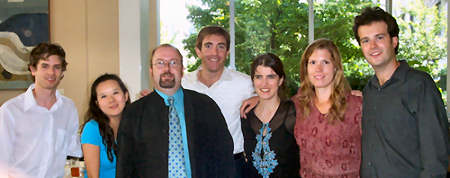Critical
Distance: counter)induction, Tenri Cultural Institute, New York City, 9 September,
2005 (BH)

Eric Moe: And Life Like Froth Doth Throb (1997,
New York premiere)
Douglas Boyce: String Trio: "102nd & Amsterdam"
(2005, world premiere)
Karel Husa: Sonata a tre (1982)
Alexandre Lunsqui: After Frottage
(2004)
Eli Marshall: Opus Prime (2004, New York
premiere)
Georges Aperghis: Mouvement pour quintette (1975, U.S. premiere)
counter)induction
Benjamin Fingland, clarinets
Asmira Woodward-Page, violin
Sumire Kudo, cello
Jessica Meyer, viola
Blair McMillen, piano
Kyle Bartlett, composer
Douglas Boyce, composer
One could hardly imagine a more invigorating beginning
to the fall season than this concert by counter)induction,
a contemporary music group directed by composers Kyle Bartlett
and Douglas Boyce, with the added fire of some of New York’s
finest young musicians. In addition to the theme of the evening (“composers
living in exile, either literal or metaphoric”) there seemed
to be a common bent toward high-energy expression.
Eric Moe’s tongue-twisting And Life Like Froth Doth
Throb (repeat that fast twenty times) was as fizzy as its
title. Moe’s short study, for viola and cello, is a
brief sketch whose rhythmic pulse would not be out of place
in the company of Bartók’s Forty-Four Studies for Two Violins. Asmira Woodward-Page
and Sumire Kudo
gave it all the energy it needed.
Inspired by the “kaleidoscopic rhetoric” of his father,
Mr. Boyce offered an equally voluble and intriguing new work,
String Trio: "102nd & Amsterdam", that
opens with ghostly harmonics, before being interrupted by a
violent middle section that eventually evaporates.
On viola, Jessica Meyer joined Ms. Woodward-Page and
Ms. Kudo for this high-energy romp,
and Mr. Boyce must have quite a dad.
The first half closed with a stunning trio by Karel Husa, Sonata a tre, dispatched with a fury that seemed almost at odds
with the serenity of the high-ceilinged Tenri
gallery space. A friend
next to me wondered how she could have missed this marvelous
piece, written in 1982 – it had escaped my radar, too.
I hope this ensemble will continue to keep this work
in its repertoire. Its
first movement, With intensity, has a folk-music feel,
but builds to a punishing climax before a suddenly ending, as
if watching a cat vanishing over a fence.
With sensitivity asked for Benjamin Fingland
to lower his clarinet bell just over the piano strings, and
is also intense, almost with a feeling of dread, but ends quietly,
hovering, as if suspended in air. The final With velocity includes some
high-intensity solo work for the clarinetist, and the violin
creates an uncanny sound that evokes a dog yelping.
Blair McMillen is the group’s pianist, and this Husa workout showed him at his ferocious best.
Eli Marshall is a young composer now based in Beijing,
and his Opus Prime is a delightful marriage of say, Hindemith
and Shostakovich (whose child ultimately resembles neither),
and I’d be very surprised if other chamber music groups don’t
pick up this work. It is ebullient, almost savage, and in the hands
of these musicians exuded confidence in every bar. The work’s unison passages tested all, and Ms.
Kudo once again displayed some precise
cello work.
The artist Max Ernst inspired Alexander Lunsqui’s After Frottage, for clarinet and cello, filled
with extreme gestures (a common thread in many of these works)
– brilliant flashes of sound separated by pauses.
Mr. Fingland seemed to reach
a peak here, his virtuosity matched again by Ms. Kudo.
Georges Aperghis is sorely
underrepresented by performances in the United States, and this
witty Mouvement pour quintette
shows why. Composed in
1975 – thirty years ago – this was its first performance in
the United States. Combining compositional skill with humor and
sly, slinky asides, Mouvement
contains complexity to spare, but never turns so dense that
its basic athleticism is obscured.
It is worth quoting Aperghis’ own remark about his work, “Make music of everything,”
and this entertaining work bears this out in a freely atonal
yet hugely entertaining way.
Occasionally it seems like some kind of traditional rhapsody
intentionally mauled and deflated. It would have been enough to hear this work
performed, since it requires not only a surfeit of skill but
some humor, but counter)induction leaped ahead to give
it the kind of authority one might expect from groups with a
much more lengthy pedigree.
Bruce
Hodges
Photo
credit: Douglas Boyce
For more information: www.counterinduction.com



